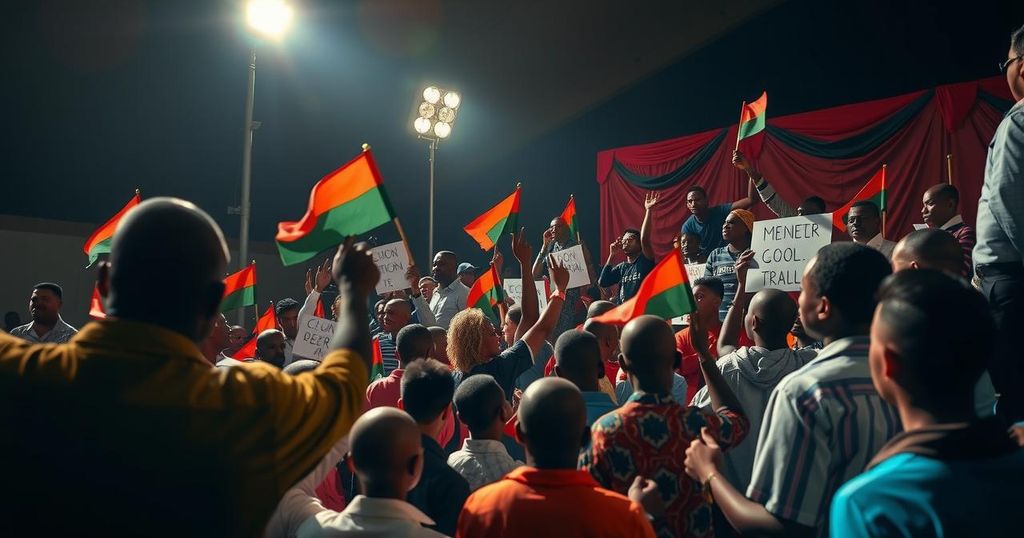Politics
AFRICA, BASED INSTITUTE FOR PUBLIC POLICY RESEARCH, BOTSWANA, DEMOCRACY, FR, FRELIMO, GOVERNANCE, GOVERNMENT, GRAHAM HOPWOOD, INSTITUTE FOR PUBLIC POLICY RESEARCH, KALAHARI, MOZAMBIQUE, NAMIB, NAMIBIA, PARLIAMENTARY SEATS, SOUTH AFRICA, SOUTH WEST AFRICA PEOPLE ’ S ORGANISATION ) PARTY OF NAMIBIA, SOUTHERN AFRICA, SOUTHERN AFRICAN, WINDHOEK
Jamal Walker
0 Comments
Namibia Elections 2024: A Pivotal Contest for Political Power
Namibia is gearing up for pivotal presidential and parliamentary elections amid regional political upheavals. The ruling SWAPO party faces strong challenges from opposition figures like VC Netumbo Nandi-Ndaitwah and the IPC’s Panduleni Itula. Youth dissatisfaction with governance, economic disparity, and corruption form the election’s backdrop, potentially reshaping the nation’s political future.
The 2024 elections in Namibia promise to be a pivotal moment for the Southern African nation, as citizens prepare to cast their votes in presidential and parliamentary elections that are expected to be among the most contested in the country’s history. As the ruling SWAPO Party faces increasing discontent and competition from new political entities, the landscape of Namibian politics may shift dramatically.
This election follows a series of ups and downs for liberation parties in the region, including recent defeats in Botswana and the struggles faced by the governing Frelimo party in Mozambique due to allegations of electoral fraud. Namibians will head to the polls with the knowledge that they could witness a significant shift, potentially leading to a change in leadership from SWAPO, which has been at the helm since the nation’s independence in 1990.
Among the key challengers is Vice President Netumbo Nandi-Ndaitwah, who, if elected, would become Namibia’s first female president. Despite her popularity, especially among older voters, she must contend with a younger electorate that is increasingly disillusioned with SWAPO’s governance. Polls indicate that youth dissatisfaction with corruption, economic inequality, and unemployment could propel alternative candidates into contention.
Former SWAPO leader Panduleni Itula emerges as a formidable contender, having made a strong showing in the previous elections. Now leading the Independent Patriots for Change (IPC), Itula focuses on appealing to youth through promises of economic reforms and job creation. Meanwhile, other opposition leaders such as McHenry Venaani and Bernadus Swartbooi also vie for attention, representing varying interests within the electorate.
As Namibians prepare to vote, underlying issues such as economic inequality, unemployment, and corruption remain critical to the discourse surrounding these elections. With over a million eligible voters, the stakes are high, and the electoral results on November 27 will determine the direction of the country’s future. The transition back to a paper ballot system introduces additional scrutiny regarding the transparency and timeliness of results, creating potential corridors for unrest depending on the outcome.
The upcoming elections in Namibia are set against a backdrop of political upheaval across Southern Africa, where several ruling parties have faced unprecedented electoral challenges. The SWAPO Party, which has governed Namibia since its independence, is experiencing mounting pressure from a populace increasingly frustrated by economic disparities, widespread unemployment, and allegations of corruption. These elections mark a critical juncture as opposition parties aim to capitalize on this discontent, although the lack of coordination among these groups may hinder their chances against the entrenched ruling party.
In conclusion, the 2024 elections in Namibia represent a pivotal moment for the country as it confronts pressing issues that have alienated many voters from the ruling SWAPO Party. With a competitive field of candidates and a large youth electorate eager for change, the potential for significant political shifts is palpable. The outcome of this election will not only influence Namibia’s immediate future but may also reshape the broader political landscape of the region.
Original Source: www.aljazeera.com




Post Comment